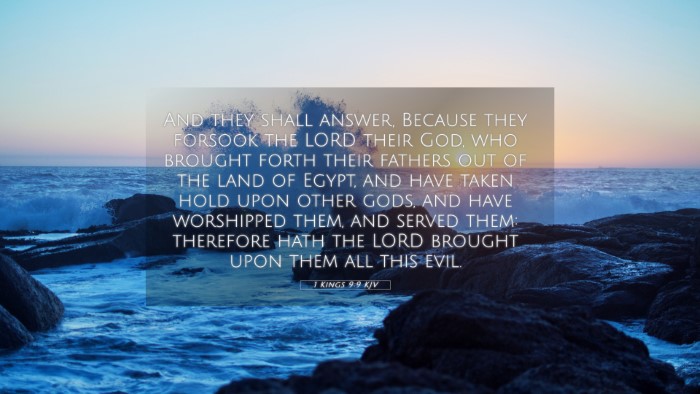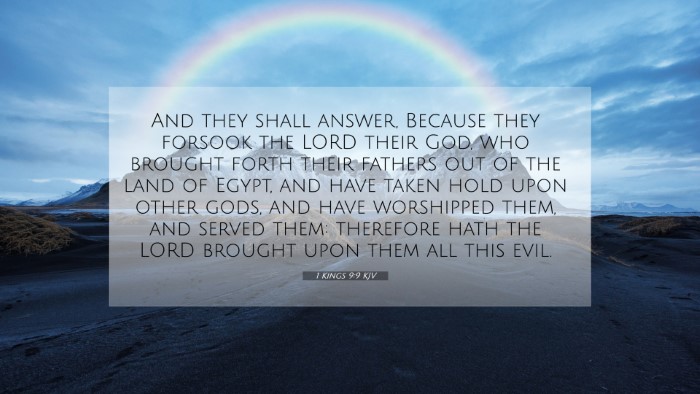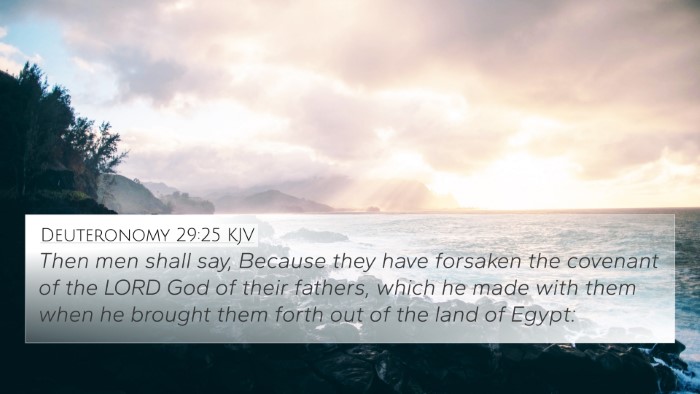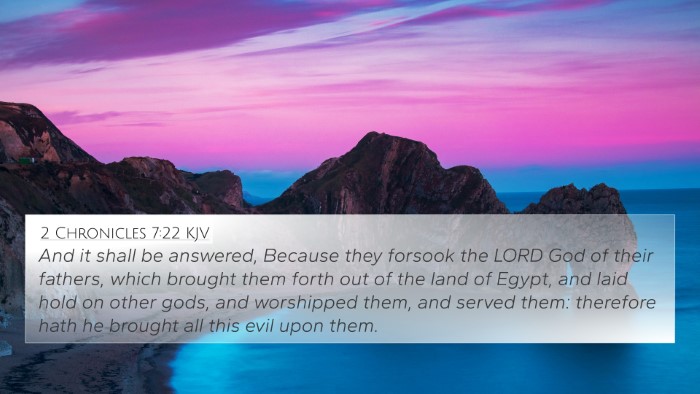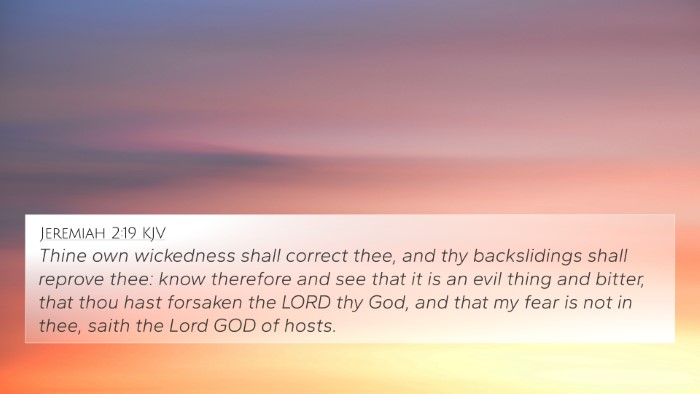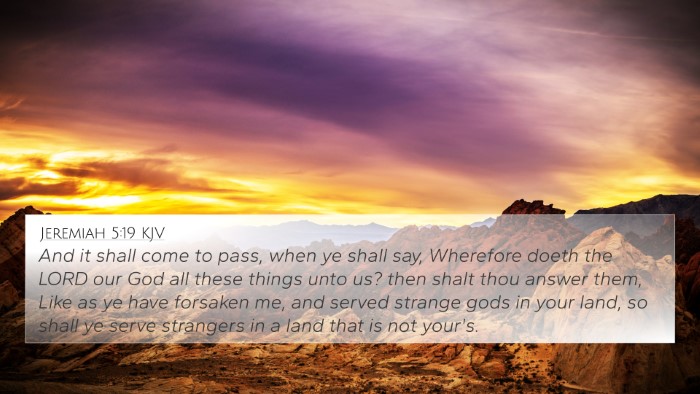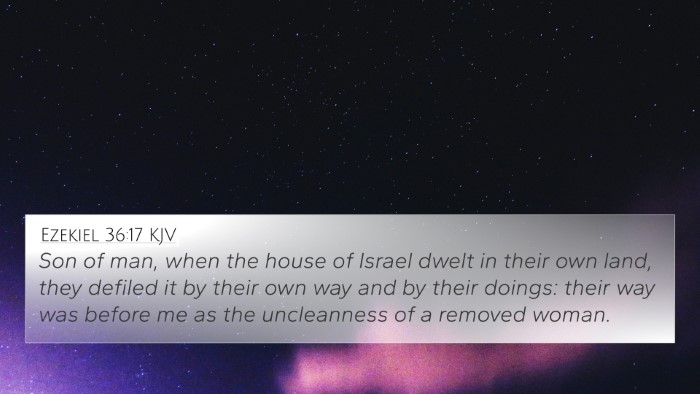Understanding 1 Kings 9:9
1 Kings 9:9 states: "And they shall answer, Because they forsook the LORD their God, who brought forth their fathers out of the land of Egypt, and have taken hold upon other gods, and have worshipped them, and served them: therefore hath the LORD brought upon them all this evil."
This verse is a part of God's warning to the people of Israel regarding the consequences of turning away from Him. It reveals critical themes in the Scriptures about idolatry, divine judgment, and the importance of covenant fidelity.
Commentary Insights
According to Matthew Henry, this verse serves as a reminder of the consequences that follow when a people abandon their covenant with God. Henry emphasizes that forsaking God leads to spiritual and moral decay, which ultimately leads to divine judgment.
Albert Barnes elaborates on the historical context, noting that this warning served as a retrospective call for the Israelites to remember their past deliverance from Egypt. This reflection was meant to contrast their current unfaithfulness and highlight the gravity of their disobedience to God's commandments.
Adam Clarke points out that this verse encapsulates a broader theological theme that recurs throughout the Bible—God's faithfulness juxtaposed against human unfaithfulness. Clarke stresses the importance of recognizing the impacts of idolatry and the resulting wrath from God, as it signifies a break in the covenant relationship.
Key Themes in 1 Kings 9:9
- Divine Judgment: The verse emphasizes the idea that turning away from God results in judgment, a theme consistent throughout scripture.
- Idolatry: The Israelites worshipping other gods highlights the dangers of placing trust in entities apart from the true God.
- Covenant Relationship: The mention of their fathers being brought out of Egypt underlines the importance of fidelity to God's covenant.
- Repentance: Implicit in the warning is the need for the people to recognize their sin and return to God.
Cross-References for 1 Kings 9:9
- Deuteronomy 30:17-18: A warning against turning aside to other gods that leads to curse.
- Judges 2:13-14: Reflects on Israel turning to idolatry and the resulting anger of the Lord.
- 2 Kings 17:7-23: Discusses the reasons for Israel's exile and God's responses to their unfaithfulness.
- Jeremiah 2:13: God’s indictment against Israel for forsaking Him, the fountain of living waters.
- Hosea 4:6: The people are destroyed for lack of knowledge, emphasizing the importance of remaining in covenant truth.
- Ezekiel 14:6: Calls for Israel to turn from their idols and return to God.
- Romans 1:21-24: New Testament reflection on idolatry and the consequences of turning away from God.
- Revelation 3:19: Christ's call for the Laodiceans to repent, connecting the theme of discipline and restoration.
- 1 Corinthians 10:7: A warning about becoming idolaters, linking to the lessons learned from Israel’s history.
- Matthew 6:24: You cannot serve two masters, a fundamental principle that ties back to fidelity to God.
Thematic Connections and Implications
1 Kings 9:9 serves as a critical link to understanding the Old Testament's overarching message about the importance of worshiping God alone. When examining Bible verse cross-references, one can observe a prevalent theme of God's faithfulness versus human unfaithfulness.
These connections between Bible verses allow for a richer understanding of scriptural teachings regarding repentance, redemption, and the consequences of idolatry. By exploring these themes in a comparative Bible verse analysis, one gains deeper insights into how the message of 1 Kings 9:9 echoes throughout scripture.
Cross-referencing can provide significant insights when studying these themes. For instance, using tools for Bible cross-referencing, one can identify similar motifs of divine judgment not just in historical contexts, but also in the teachings of Jesus in the New Testament.
How to Utilize Bible Cross-References
For those interested in digging deeper into the scriptural meanings, utilizing a Bible concordance can be an effective method to locate related scriptures. Through a cross-reference Bible study, one can establish a coherent narrative across both Old and New Testament passages.
To achieve a thorough understanding of specific themes and to identify connections between the Old and New Testament using methods of cross-referencing Bible study, it is worthwhile to track parallels and investigate the evolving narrative of God's relationship with humanity.
Conclusion
Ultimately, 1 Kings 9:9 serves as a potent reminder of the risks involved when individuals or nations turn away from God. This verse not only calls for introspection but also invites readers to examine the broader scriptural landscape, engaging in an inter-Biblical dialogue that enriches and informs one’s faith journey. By exploring Bible verses that relate to each other, believers can uncover the profound wisdom and consistent warnings against idolatry that resonate throughout the entirety of the Bible.

